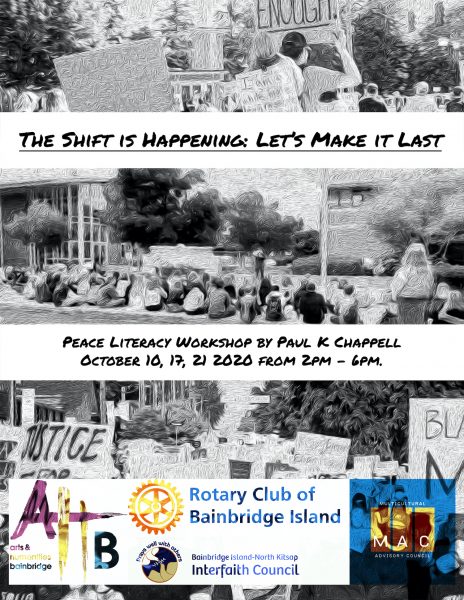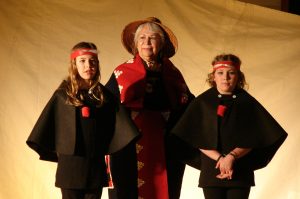There’s been a shift. Thousands of peaceful children, senior citizens, and neighbors marched downtown Winslow to city hall chanting, “Black Lives Matter!”; girls and young women voiced their hurt against sexual assault; mothers petitioned and raised their concerns about protecting our children to the Bainbridge Island Police Department. All of this took place on our island as both rural and large cities across our country have continued to demand change.
We’ve been motivated, inspired, and yearning to be effective activists of lasting transformation.
We attended Paul K. Chappell’s Peace Literacy Workshop in Oct. 2020.
“Peace Literacy has the capacity to repair our broken parts and create a nonviolent world anchored in dignity, meaning, purpose, and compassion for all. Given the crucial role that Peace Literacy can play, I support the recognition of education in Peace Literacy as a universal human right.”
—Archbishop Emeritus Desmond Tutu
Carol Reitz, a Bainbridge Island Rotarian and music education advocate organized this workshop in Feb. 2020 with 100 people representing various non-profit organizations from the island. It was presented by Paul K. Chappell, a graduate of West Point and a veteran of the war in Iraq, who created the idea of Peace Literacy after his time in the military. Chappell is the Peace Literacy and Leadership Director for the Nuclear Age Peace Foundation. Reitz was so moved by the response from the community that she enlisted fellow peace warriors to bring the “next steps” to Bainbridge Island. Arts & Humanities Bainbridge (AHB), Bainbridge Island Japanese American Community (BIJAC), the Multicultural Advisory Council (MAC), and The Bainbridge Island/North Kitsap Interfaith Council signed on.
AHB asked fellow attendees, Carol Reitz and Pamela Lee about their thoughts on the workshop.

Why Peace Literacy?
Carol Reitz: I’m a fairly new Rotarian here on Bainbridge, and had the opportunity to attend a district conference in May of 2019 up in Victoria, BC. Paul Chappell, was a key note speaker. I was so impressed with his explanation of why we need to teach skills to help people and why addressing this is really the basis for achieving any lasting peace. If we can develop skills to work with each other in spite of our differences, then so can countries, political parties and other groups.
What urged you to participate?
Reitz: I read two of the seven books Paul had written, and appreciated the non-violent approach that he promoted based on his research into various philosophies across political and religious thought – Gandhi, Martin Luther King, Jr, Sun Tzu The Art of War, Buddhism, Christianity, the military. Paul was invited to and addressed a cross-section of Bainbridge Leaders in February of 2020. From that, we generated interest for the next step, which was a more intensive, multi-day workshop.
Pamela Lee: Inez [of AHB] urged me to participate, and that was enough motivation for me.
What skills set did you gain that will enhance your overall engagement?
Reitz: Understanding trauma and how it hijacks the normal human response to situations was an important eye-opening concept. It really helped me understand my father, who passed away three years ago. At age 12, he along with his family were forcibly removed from their home in California, and put into the prisons built for the Japanese Americans in 1942. The three years there was very traumatizing, and especially because of the onset of adolescence. It had a profound effect on his ability to trust people, to believe in himself, and keep control of the deep-seated anger.
Understanding that we all walk around in our “world view” bubble, helps with providing an effective approach in relating to, or trying to change someone’s heart and mind – also, something that came too late for my dad and me. Certainly, it gives me much more empathy for the person sitting across from me, or yelling at me, or spouting things I don’t agree with.
Lee: I learned Peace Literacy’s definition of well-being, and found it aligned with my teaching practices. This intrigued me, and led me to wonder how I could illustrate these ideas within my pedagogy which currently applies but not define them.
How does Peace Literacy fit into social justice & our current climate?
Reitz: Because of the nature of our deep political divide, we need the tools to have productive conversations about our views. Ignoring it, and avoiding it doesn’t solve anything, and yelling and screaming at each other doesn’t do anything to change hearts and minds. The skill of knowing how to truly listen is needed – and understanding that it is a skill that can be learned, that it is so simple, yet so difficult to apply.
Lee: I think the thrust of the program is to integrate and define Peace Literacy with current 21st Century Skills. Therefore, their incorporation would address societal needs and individual well-being within current thinking strategies. The trick is how to transmit these ideas without labelling, being didactic or lecturing. Rather, how to introduce these concepts through artistic play which is the estuary of creative thought and well-being.
What surprised you?
Reitz: Learning more about Paul Chappell’s background in the military, and having attended West Point, I came away with a much better understanding and appreciation for the goal of a West Point education. It is about creating great leaders, which could be valid for any type of organization – how to motivate people, inspiring their people, helping them unlock their full potential as human beings. General Mac Arthur made radical changes to West point curriculum – one most profound was that military leaders who bully and demean their soldiers create an unstable unit, and the most effective leaders treat their soldiers with empathy, fairness and respect.
Lee: That the classes were in lecture form rather than an experiential format.
Next steps – what are your plans regarding the application of the skills?
Reitz: There are specific concepts that I’d like to take from the workshop that could be the basis for a strategic plan for the community. These could also include partnering with organizations already doing work to provide reconciliation and peace efforts, including understanding trauma, the six-headed hydra of dehumanization, three-faceted sword of rehumanization, aggression vs violence, and the seven deep roots for healthy belonging.
Lee: I would like to take Peace Literacy’s Training for Trainers. Then I would like to create programming that could be used in public school settings.

Carol Reitz is originally from Minnesota, and moved to Bainbridge Island 3 years. She is currently a Bainbridge Island Rotarian, on the board of the BI Japanese American Community and plays piano for high school choirs.

Pamela Dharamsey Lee, director, choreographer, singer, and visual artist, has been developing her own integrated arts pedagogy since 1992 through her company Ox + Dragon. She has been teaching in a variety of settings and studios on both coasts, helping children to access their own creative synthesis, and learn to work as an ensemble. On Bainbridge Island she has worked in schools and studios through Arts & Humanities Bainbridge, BIMA, Bainbridge Ballet, Bainbridge Performing Arts and the Olympic Performance Group. Lee is also the creator of The Island School series “Paved with Gold” in collaboration with teachers Betsy Carroll and Mike Derzon. Most recently she directed “Artifact Pattern” in collaboration with Janet Knox and Awkward Grace. She is also an AHB teaching artist.